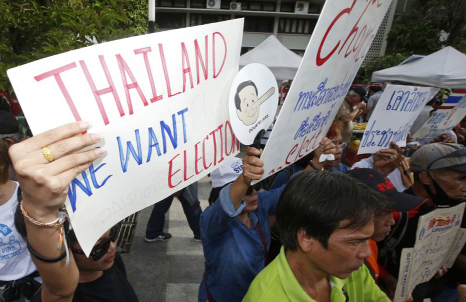
AP, Bangkok :
Four years after seizing power, Thailand’s junta has a singular success it never hoped for: uniting a politically divided nation in growing dissatisfaction with the thin-skinned rule of the generals.
After rifle-toting soldiers overthrew Thailand’s elected government in a bloodless coup in May 2014, the new military leaders, like a succession of Thai coup makers before them, pledged reform and reconciliation and promised they wouldn’t stay long.
But after repeatedly delaying elections, frustration with the junta and its leader, Prime Minister Prayuth Chan-ocha, the former army chief, is visibly growing. And far from stepping back, they appear to be planning to maintain a vice-like grip on the country by turning political parties into their proxies if elections are held. The latest vague date for an election is February next year.
From humble street-food sellers ordered off Bangkok’s sidewalks to wealthier echelons of society, the junta’s promise to “return happiness” to Thailand now rings hollow.
“They came in to pledge for reform, reconciliation and corruption eradication, but in fact, on all three fronts, they’ve failed,” said Thitinan Pongsudhirak, a political scientist at Chulalongkorn University. “If you look around Thailand now, no one, no segment, no faction, no key movement is really behind the coup and the military government anymore.”
One of world’s top tourist destinations and a long-standing U.S. ally, Thailand has suffered more than a decade of upheaval, including two coups, as its conservative establishment struggled to smother a grass-roots political revolution fostered by the electoral success of billionaire businessman Thaksin Shinawatra.
His leadership was marred by corruption and human rights abuses and he now lives abroad in exile, but the political earthquake he unleashed with policies aimed at improving the lot of Thailand’s poor rural majority, and diminishing Bangkok as the country’s overweening center of political gravity, continues to reverberate.
Thaksin was ousted in a 2006 coup, but his proxies swept to power in successive elections, including a party led by his younger sister, Yingluck Shinawatra. The 2014 coup that ousted her government followed months of street protests in Bangkok against politicians Thaksin-deploring urbanites saw as inept and corrupt. It was Thailand’s 12th military takeover since its absolute monarchy was abolished by a 1932 coup.
Four years after seizing power, Thailand’s junta has a singular success it never hoped for: uniting a politically divided nation in growing dissatisfaction with the thin-skinned rule of the generals.
After rifle-toting soldiers overthrew Thailand’s elected government in a bloodless coup in May 2014, the new military leaders, like a succession of Thai coup makers before them, pledged reform and reconciliation and promised they wouldn’t stay long.
But after repeatedly delaying elections, frustration with the junta and its leader, Prime Minister Prayuth Chan-ocha, the former army chief, is visibly growing. And far from stepping back, they appear to be planning to maintain a vice-like grip on the country by turning political parties into their proxies if elections are held. The latest vague date for an election is February next year.
From humble street-food sellers ordered off Bangkok’s sidewalks to wealthier echelons of society, the junta’s promise to “return happiness” to Thailand now rings hollow.
“They came in to pledge for reform, reconciliation and corruption eradication, but in fact, on all three fronts, they’ve failed,” said Thitinan Pongsudhirak, a political scientist at Chulalongkorn University. “If you look around Thailand now, no one, no segment, no faction, no key movement is really behind the coup and the military government anymore.”
One of world’s top tourist destinations and a long-standing U.S. ally, Thailand has suffered more than a decade of upheaval, including two coups, as its conservative establishment struggled to smother a grass-roots political revolution fostered by the electoral success of billionaire businessman Thaksin Shinawatra.
His leadership was marred by corruption and human rights abuses and he now lives abroad in exile, but the political earthquake he unleashed with policies aimed at improving the lot of Thailand’s poor rural majority, and diminishing Bangkok as the country’s overweening center of political gravity, continues to reverberate.
Thaksin was ousted in a 2006 coup, but his proxies swept to power in successive elections, including a party led by his younger sister, Yingluck Shinawatra. The 2014 coup that ousted her government followed months of street protests in Bangkok against politicians Thaksin-deploring urbanites saw as inept and corrupt. It was Thailand’s 12th military takeover since its absolute monarchy was abolished by a 1932 coup.

